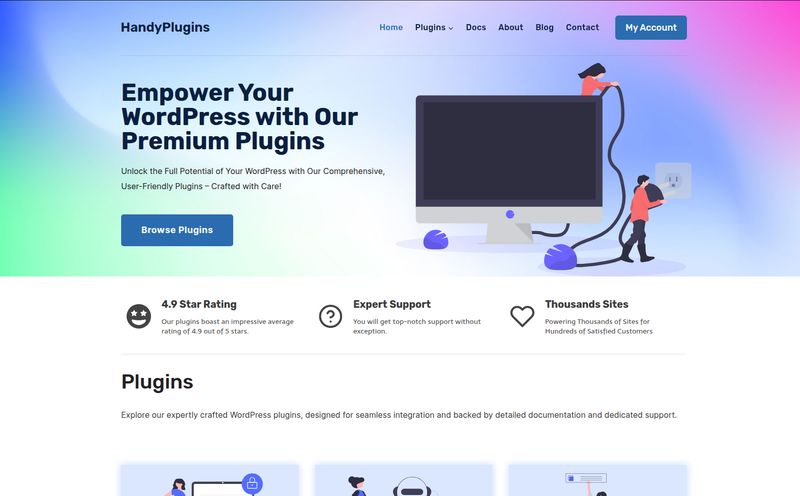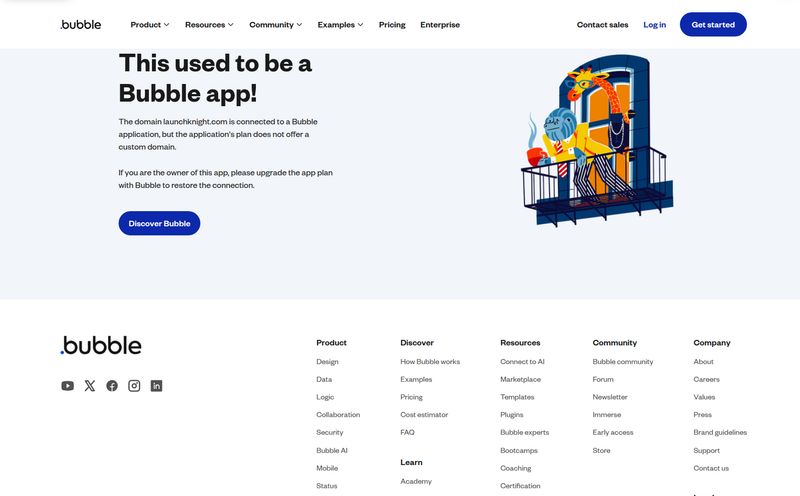How much of your week is spent playing calendar Tetris? You know the game. The endless email chain of "Does Tuesday at 2 PM work for you?" followed by "Ah, sorry, I'm booked then. How about Wednesday morning?" It's a soul-crushing, productivity-killing dance that we all seem to accept as part of modern work. I've personally lost entire afternoons to it.
So, when I hear about a new tool that promises to be my personal AI assistant, my ears perk up. The latest one to cross my desk is Chronify. It claims it can handle all those pesky secondary tasks—scheduling, managing communications, making arrangements—just like a real human personal assistant would. A bold promise, for sure. One that could either be a game-changer or, well, another piece of overhyped vaporware.
Naturally, I had to see for myself. Though, my investigation hit a weird snag almost immediately... but more on that later.
What Exactly is Chronify Supposed to Do?
At its heart, Chronify wants to be your digital chief of staff. It's not just another booking link tool like Calendly, which is great for what it does. No, Chronify aims to be more proactive. It’s designed to be a genuine assistant you can delegate tasks to. The idea is that you can just tell it what needs to happen—like "Find a 30-minute slot for me and Sarah to talk next week"—and it gets it done.
It connects to your Google Calendar, learns your preferences over time, and starts making intelligent decisions on your behalf. It’s supposed to free you up from the administrative muck so you can focus on the stuff that actually moves the needle in your business. At least, that's the theory.

Visit Chronify
The Core Features I Could Get My Hands On
So what's actually under the hood right now? While some of its grand vision is still on the horizon, the current version of Chronify is built around a pretty solid core of productivity features.
The AI Scheduling Assistant
This is the main event. The AI scheduler is the workhorse of the platform. The integration with Google Calendar is the first step, and once it's synced, it starts to get a feel for your routine. It sees your standing appointments, your busy blocks, and the times you prefer for deep work versus meetings. I’ve always been a bit skeptical of 'learning' AI because it can be a bit… clumsy at first. But the idea of an assistant that gets smarter the more you use it is undeniably appealing. No more manually blocking out focus time; the assistant should, in theory, learn to protect it for you.
Proactive Schedule Management
This is where Chronify starts to differ from its peers. It's not just reactive; it's proactive. Think of it like a GPS for your day. It doesn't just tell you the route; it actively reroutes you if it detects a traffic jam ahead. If a meeting gets canceled, it doesn't just leave a gaping hole in your schedule. It could, for instance, see that you have a pending task that would fit perfectly into that new slot and suggest you tackle it. This shift from passive tool to active partner is what makes me most excited about tools like this one.
A Single Hub for Task Management
My tasks live in a chaotic multiverse. Some are in Asana, some on a sticky note on my monitor, and a few are just vague anxieties floating around in my head. Chronify's goal of bringing all your to-dos into one place, right alongside the calendar where you'll actually do them, is a smart move. Tying tasks directly to your schedule makes them less abstract and more actionable. It's one thing to have a list of things to do; it's another to have them intelligently slotted into your available time.
The Elephant in the Room: The "Coming Soon" Features
Alright, let's talk about what's missing. When you visit the Chronify site, you'll see mentions of a "Communications Manager" and an "Arrangements Manager." These sound incredible. An AI that could handle follow-up emails or book a restaurant for a lunch meeting? Sign me up. Yesterday.
The problem? They're both stamped with the classic "Coming Soon" label. This is the double-edged sword of new tech. On one hand, it shows ambition and a clear roadmap. On the other, it means you're buying into a promise. It makes the platform feel a little bit like it's in a public beta. Is it a half-baked product or a strategic rollout? I'm leaning towards the latter, but for a user who needs full functionality today, it’s a definite drawback.
The Good, The Bad, and The... Intriguing
So, let's boil it all down. No tool is perfect, especially not a new one.
What's good is genuinely exciting. The AI-driven scheduling that learns your habits is a massive potential time-saver. The proactive adjustments and automated task management are features that could seriously reduce cognitive load. I mean, who wouldn't want an assistant to handle the boring stuff?
But there are some trade-offs. First, the setup. Any tool like this requires you to hand over the keys to your calendar and spend some time getting it synced up. It's a necessary evil. Second, you have to be comfortable with the idea of AI managing your schedule. I'd recomend keeping a close eye on it at first, just to make sure it doesn't book you for a client call at 3 AM. You still need to be the final boss. And of course, the fact that some of the most powerful-sounding features aren't even here yet is a significant point to consider.
What's the Damage? A Look at Chronify's Pricing
This is where my investigation got interesting. I scoured their site for a pricing page. I clicked every link. I even hit a 404 error page at one point, which tells me the site is probably still a work in progress. As of this writing, there is no public pricing information available. Zilch.
This isn't uncommon for a tool in its early stages. They're likely more focused on gathering users and feedback than on monetization. If I were to guess, I'd expect a model similar to what we see with competitors like Reclaim.ai. Probably a free tier with basic scheduling features and one or more paid tiers for the advanced AI capabilities, multiple calendar syncs, and team features. For now, it seems to be free to try, so the only investment is your time.
So, Is Chronify Worth Your Time (Right Now)?
Here’s my take. Chronify feels like a peek into the future of personal productivity. The concept is brilliant. The execution, from what I've seen, is promising but incomplete. It's a tool with massive potential.
Who should try it? If you're an early adopter, a tech enthusiast, or a productivity nerd who loves to be on the cutting edge, you should absolutely give Chronify a spin. If you're drowning in scheduling tasks and are willing to tolerate a few rough edges to get some relief, it's worth the experiment.
Who should wait? If you're looking for a fully-featured, battle-tested tool that can manage your entire team's complex scheduling needs today, you might want to hold off. If the idea of a "Coming Soon" tag on a core feature gives you anxiety, maybe keep it on your watchlist for a few months.
I, for one, am going to be keeping a very close eye on this one. It’s got all the right ingredients, it just needs a little more time in the oven.
Frequently Asked Questions about Chronify
- 1. How is Chronify different from a tool like Calendly?
- Calendly is primarily a tool for letting others book time with you easily. It's fantastic for that. Chronify aims to be more of a proactive assistant. It doesn't just offer up your free time; it actively helps you manage your tasks and schedule, and in the future, your communications and arrangements.
- 2. Is Chronify difficult to set up?
- There's an initial setup process that involves connecting your Google Calendar and setting your preferences. Like any new tool, it takes a few minutes to get started. I'd say the investment is minimal for the potential time savings down the road.
- 3. Can I trust the AI with my entire schedule?
- I'd advise a "trust but verify" approach, especially at first. The AI learns from your behavior, so there might be a learning curve. It's best to review its suggestions and appointments initially to ensure it aligns with your priorities before letting it run on complete autopilot.
- 4. When will the Communications and Arrangements features be released?
- There's no official release date for these features yet. The website lists them as "Coming Soon," which suggests they are in active development. It's best to check their official site for the latest updates.
- 5. Does Chronify only work with Google Calendar?
- Based on the available information, the primary integration is with Google Calendar. Support for other platforms like Outlook or iCloud hasn't been announced, but it's a common request for tools in this space, so it may be on their roadmap.
Final Thoughts
Navigating the world of productivity tools can be exhausting. Every week there's a new 'savior' that promises to fix all our problems. Chronify might not be that savior... yet. But it's one of the most interesting contenders I've seen in a while. It gets the core problem right: we spend too much time on low-value administrative work. If the team behind it can deliver on their full vision, Chronify could easily become an indispensable part of my tech stack. For now, it remains a fascinating and promising tool to watch.
Reference and Sources
- The Official Chronify Website (URL not provided, as per tool info)
- Reclaim.ai - A competitor in the AI calendar space.
- Calendly - A popular scheduling automation platform.
- The New Wave of AI Assistants - Contextual reading from TechCrunch on the rise of AI PAs.



